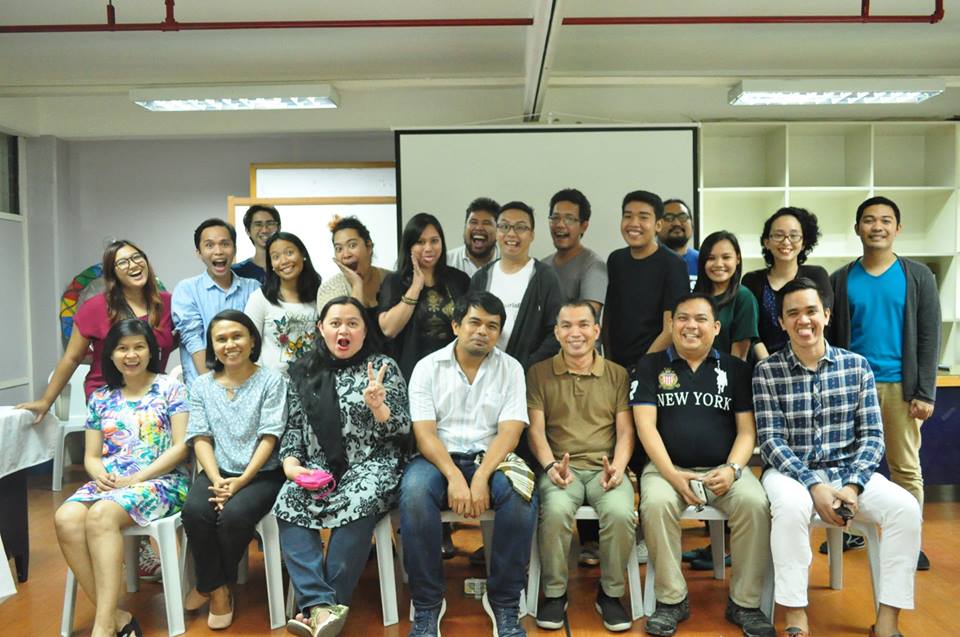
CDO WRITERS. The fellows, panelists, and organizers of the 1st Cagayan de Oro Writers Workshop strike a wacky pose at the end of the three-day event held at the Dell Reading Room of Xavier University. Photo grabbed from CDO Poetry Night's Facebook page.
By Stephen J Pedroza
"Balay-balay" is the journey of a little girl named Clarita in picturesque Camiguin set during the turbulent times of the Second World War. Camiguin, described with its glory and isolation, raises innocent Clarita to learn how to reflect on the follies of life and the corollaries of war.
“Balay-balay,” a short fiction piece by Ervin Silva, was regarded as one of the standouts during the first-ever Cagayan de Oro Writers Workshop (CDOWW). Panelists say “the description was so vivid, it felt like we were transported to Camiguin in the 20th century.”
Silva was among the nine young CDO-based writers who formed part of the first batch of fellows challenged to revitalize the local literary scene of Cagayan de Oro.
Xavier University hosted CDOWW organized by the Nagkahiusang Magsusulat sa Cagayan de Oro (NAGMAC), in partnership with XU Department of English Language and Literature (DELL), from April 1 to 3. The workshop sessions were facilitated by a diverse selection of writers affiliated with different universities and colleges across the city.
Organizing this inaugural writers workshop in CDO was “a dream come true,” shared Mai Santillan, one of the core leaders of NAGMAC and CDOWW. “Honestly, we only put it as suntok sa buwan (blow to the moon). It was wishful thinking really.”
Santillan had not thought the workshop would happen until they approached XU's English Department to form a partnership and to exchange resources. “And then [CDOWW] actually happened. It was surreal.”
‘Take me in my entirety’
Stephanie Gonzaga's poem titled "Fragments," was a poetry standout, too, where the “snapshots of a romantic relationship” were placed under the spotlight.
“While we've encountered a lot of poems and stories with this subject matter, her piece had a different take on it. It shows how relationships blossom: from physical attraction, moments shared and turned into memory, to the eventual separation. And even if we've been left wounded and broken by it, at the end of the day, we say 'Take me in my entirety,' just as how the poem ends,” Santillan explained.
XU-English faculty member and critic-dramaturg Rogelio F Garcia Jr couldn’t help gushing over Gonzaga’s piece, shared Sanitllan. “He even volunteered to read it before it was critiqued,” she quipped.
The much-anticipated highlight of the workshop was the critiquing of the literary works of the fellows.
“The panelists read the pieces as they were and appreciated the potential of the works. Of course, they pointed out the flaws but not without citing expert opinion as to why,” Santillan related.
Poet Dr Arlene J Yandug and fictionist-essayist Dr Ma Elena L Paulma, who served as mentors to the fellows, encouraged the emerging writers to continue writing and to find their distinct voices in the craft.
Poet-fictionist Raul G Moldez emphasized how, as writers, we have the responsibility to show “a ray of hope” even if our stories and poems carry dark undertones.
Garcia also imparted suggestions on how to improve their works from their own perspectives.
During the discussions, workshop director and poet Mark Anthony L Daposala was Socratic to ask questions so the fellows could expressed their thoughts on various subjects, literary in nature or otherwise.
A humbling experience
“This was my first big activity in creative writing,” said Gari Jamero, a fellow for fiction, “I had just started writing fiction this year and it feels great that I get to contribute to the local literary scene through this workshop.”
Jamero admitted that the workshop pushed him to further his craft and to pose the same challenge to aspiring writers.
“NAGMAC fellows are just the best people and the panelists were the most helpful critics I could've hoped for. This experience liberated me from my controlling nature and helped let my characters grow at their own pace.”
A Biology graduate from XU, Jamero said that he “highly values the experience,” adding, “it primed me for the workshop season and got me even more excited to continue writing.”
Poetry fellow Adeva Jane Hojas Esparrago, also an XU High School English teacher, described her participation to the said workshop as “a very humbling learning experience.”
“It reminded us that we had to read a lot and write a lot. That there were more drafts than final works,” she expressed. “I guess I’d have to buy a new trash bin exclusively for the writing process.”
Esparrago shared, “As writers, we have to be strong-willed and determined — challenged to capture fragile things and moments as they are and as they come.”
The organizers hope to improve the CDOWW in the following years, inviting more young wordsmiths to submit their literary works and assert CDO’s identity on the map of regional literatures in the country.
“I don't want to [preempt] it, but the XU English Department, Xavier Center for Culture and Arts, and NAGMAC are already working together to make it better next year. It’s going to be pretty big for the literary scene here in Cagayan de Oro,” Santillan revealed.
For aspiring writers who wish to join the workshop, her message is simple and crisp: “Be generous. Share your works to your family and friends. And if your friends say it's good, join NAGMAC. We'll tell why they're wrong (but in a very loving way).”